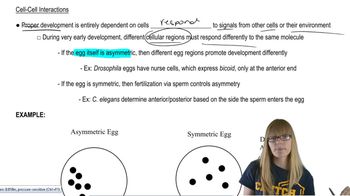Imagine yourself in the same position as Kristen Powers, faced with the decision of whether or not to undergo a genetic test that will discover if you have inherited Huntington disease. List five life decisions or choices that you think are likely to be affected by the results of the genetic test. Do you think you would make the same choice to test that Kristen made? Why or why not?
Table of contents
- 1. Introduction to Genetics51m
- 2. Mendel's Laws of Inheritance3h 37m
- 3. Extensions to Mendelian Inheritance2h 41m
- 4. Genetic Mapping and Linkage2h 28m
- 5. Genetics of Bacteria and Viruses1h 21m
- 6. Chromosomal Variation1h 48m
- 7. DNA and Chromosome Structure56m
- 8. DNA Replication1h 10m
- 9. Mitosis and Meiosis1h 34m
- 10. Transcription1h 0m
- 11. Translation58m
- 12. Gene Regulation in Prokaryotes1h 19m
- 13. Gene Regulation in Eukaryotes44m
- 14. Genetic Control of Development44m
- 15. Genomes and Genomics1h 50m
- 16. Transposable Elements47m
- 17. Mutation, Repair, and Recombination1h 6m
- 18. Molecular Genetic Tools19m
- 19. Cancer Genetics29m
- 20. Quantitative Genetics1h 26m
- 21. Population Genetics50m
- 22. Evolutionary Genetics29m
15. Genomes and Genomics
Genomics and Human Medicine
Problem B.14f
Textbook Question
Select one of the hereditary conditions from either the RUSP core conditions list or the RUSP list of secondary conditions and do some online research to find the following information:
The anticipated outcome if treatment is applied
 Verified step by step guidance
Verified step by step guidance1
Choose a hereditary condition from the Recommended Uniform Screening Panel (RUSP) core conditions or secondary conditions list. For example, you might select Phenylketonuria (PKU), a well-known genetic metabolic disorder.
Research the condition to understand its genetic basis, typical symptoms, and how it affects the body. This will help you grasp why early treatment is important.
Identify the standard treatment or intervention used for the condition. For PKU, this involves a strict diet low in phenylalanine to prevent harmful buildup.
Investigate the anticipated outcomes when treatment is applied early and consistently. Focus on how treatment can prevent or reduce symptoms, improve quality of life, and avoid complications.
Summarize your findings by explaining the importance of newborn screening for the condition and how timely treatment changes the prognosis compared to untreated cases.
 Verified video answer for a similar problem:
Verified video answer for a similar problem:This video solution was recommended by our tutors as helpful for the problem above
Video duration:
3mPlay a video:
Was this helpful?
Key Concepts
Here are the essential concepts you must grasp in order to answer the question correctly.
Newborn Screening and the RUSP
The Recommended Uniform Screening Panel (RUSP) is a list of genetic and metabolic conditions recommended for newborn screening in the U.S. It includes core and secondary conditions that can be detected early to prevent severe health issues. Understanding RUSP helps identify which hereditary conditions are routinely screened and why early detection is critical.
Recommended video:
Guided course

History and Experiments
Hereditary Genetic Conditions
Hereditary conditions are disorders passed from parents to offspring through genes. These conditions often involve mutations that affect normal biological functions. Recognizing the genetic basis of these diseases is essential for understanding their diagnosis, prognosis, and treatment options.
Recommended video:
Guided course

Modern Genetics
Impact of Early Treatment on Genetic Disorders
Early treatment of genetic conditions, especially those identified through newborn screening, can significantly improve health outcomes by preventing or reducing symptoms. Treatment may include dietary management, medications, or other interventions tailored to the specific disorder. Knowing the anticipated outcomes helps evaluate the importance of timely intervention.
Recommended video:
Guided course

Cell-cell interactions

 6:51m
6:51mWatch next
Master Human Genome Composition with a bite sized video explanation from Kylia
Start learningRelated Videos
Related Practice
Textbook Question
444
views
